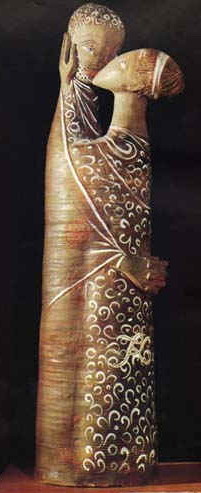

Geography/Culture: Greek.
Linguistic notes: Greek orthography Phi-iota-lambda-upsilon-rho-alpha, (Philyra). The word lime is an altered form of Old English lind, cognate with Greek elate, silver fir. Linden in England means `made of lime or lind-wood'. The lime is a species of Tilia. It is an object of beauty in spring. Later, fragrant flowers, rich in honey, attract many bees. The inner bark or Liber (Latin for bark) is called bast; it was used for paper and mats, and for tying garlands by the ancients. Bass-wood is used for paper-pulp today.
Description: Shape-shifting Goddess of healing, writing and divination, beauty and fragrance; Eponym of the island Philyra.
To whom are sacred: linden-tree (bass-wood), flowers (for healing, espcially as a restorative), inner-bark, bast, (for writing-tablets), inner-bark torn into strips (for divination); wryneck; {bee; honey}; horse.
Male associates: son, Cheiron, `The-Hand' by Kronos, `Crow', they mated in the form of horses). The Centaur Cheiron's fame as a doctor, scholar and prophet won him the name `son of Philyra'.
Titles, Variants, etc.
Geography/Culture: Greek.
Description: She was transformed into a linden-tree (and Her consort: Philemon `Friendly-Slinger', into an oak) after They had, in mortal forms, given sanctury to Gods.
Titles, Variants, etc.
Sources: EA67; EBv16/693-4; GMv2/235-6, index; IETS/98; WWGRM/44,188.